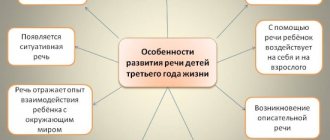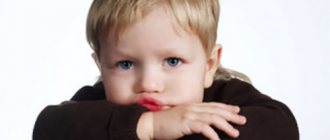The first year of a baby’s life is both a joyful and exciting period. Mothers read magazines, watch TV shows, communicate on forums and while walking, comparing their baby’s achievements with other children. He has already learned to sit, stand, and is taking his first hesitant steps. And the next expectation is related to the first word that the baby must say. And again, parents are worried, because according to statistics, speech development disorders in children are increasingly being diagnosed. Evgeny Komarovsky in his programs talks about the stages of speech development, the reasons for lack of speech and teaches how to help a child speak.
When to see a doctor
By the age of 4, children know up to 2000 words, speak clearly, pronouncing words clearly. In speech they use extended phrases of several words. They know how to inflect words and use them correctly in a sentence. They show interest in new words and understand the plot of a fairy tale or short story. Difficulties can be caused by complex words, hissing and sonorant sounds. But these are physiological norms that do not require specialist intervention.
Delayed speech development in children 4 years old can be suspected when they have deviations: in the rate of speech, pronunciation of sounds. Because of problems, the baby prefers to remain silent or speaks fragmentarily.
IRR at 4 years of age increases the likelihood of neurological and even mental abnormalities. An inferiority complex gradually develops, the baby is embarrassed or afraid to communicate with peers, and behaves separately. In the future, this will affect the learning process, academic performance and mastery of the school curriculum. Children whose parents ignore the child’s problem and do not engage in his development are especially in a difficult situation.
Therefore, at the first signs of a speech disorder, you should consult a doctor and begin treatment.
What to do to get rid of stuttering
Many celebrities have overcome stuttering. It is now difficult to believe that Elvis Presley, Bruce Willis, and Winston Churchill suffered from this defect. You can get rid of it forever. Your child can do this, no matter what speech defect he or she has. However, this requires serious effort, perseverance, and patience.
Here are the elements on which your success should rest:
- Emotional calm.
- Correct speech construction.
- Organization of the child's daily life.
- Thoughtful daily routine.
- Regular sessions with a speech therapist and psychologist.
The main thing is to practice regularly and not lose control of the problem.
Peculiarities of manifestation of delayed speech development in children 4 years old
Features of delayed speech development in children 4 years old are slow or fast speech, blurred sounds, omissions of letters or syllables. Some children do not pronounce words at all or abbreviate them, replacing words with syllables, gestures, and facial expressions.
Characteristic symptoms:
- difficulties in formulating the question and in answering the question addressed to him; the answers are usually monosyllabic (“yes”, “no”, “there”, “here”);
- poor vocabulary - usually uses only those words that are used in everyday life;
- incorrect pronunciation of complex words;
- skipping syllables and sounds;
- lack of skills in composing a simple story or sentence based on a picture;
- replacing words that sound similar;
- There are no hissing or whistling sounds in the articulation, or the patient pronounces them incorrectly;
- replacing sounds with easier ones to pronounce;
- lack of criticism of speech errors in oneself and other people.
What is stuttering
Medicine defines the problem as a speech disorder in which a person often repeats certain words or syllables, pronounces individual sounds in a drawn-out manner, without being able to pronounce them fully. Smoothness, rhythm, and tempo of pronunciation of phrases suffer. Doctors define the disorder by the term “logoneurosis.” According to statistics, it occurs in approximately 2-3% of people, that is, quite common.
Physiological reasons include spasms and convulsions of the muscles responsible for speaking. These disturbances negatively affect breathing, the strength and pitch of spoken sounds. The physiology of this process is similar to hiccups.
Causes of delayed speech development in children 4 years old
Various reasons lead to 4-year-old developmental disorder. Some of them affect the fetus in the womb, some - during childbirth and after birth.
Antenatal reasons:
- complications of pregnancy, threat of miscarriage, toxicosis, gestosis;
- illnesses of the expectant mother - exacerbation of chronic diseases, infectious and inflammatory, injuries, intoxication, bad habits;
- conditions that led to fetal hypoxia - placental pathology (anomalies, abruption), umbilical cord entanglement.
During childbirth:
- premature birth;
- rapid labor;
- injuries during childbirth;
- inadequate management of labor, use of obstetric forceps.
After childbirth, delayed speech development in children 4 years of age can result from:
- injuries, especially traumatic brain injuries, are dangerous for speech development;
- diseases - neurological, for example, cerebral palsy, encephalopathy;
- unfavorable family situation - conflicts, parents do not care for the child;
- the opposite situation is overprotection, excessive pressure and demanding parents;
- excessive stress - physical (sports), mental (overload with activities).
Predisposing factors are a hereditary predisposition to RRD at 4 years of age. These may be genetic disorders, congenital abnormalities of the nervous system,
Essence and features
The main characteristic of the psychological crisis of the 7th year of life is the rapid acquisition of new features that are characteristic of adults. The baby’s psyche loses its naivety and openness, and the inner world becomes more complex. He learns to analyze the actions of others and their reasons, begins to think about his words, and can hide the real motives of his own actions.
The transition from preschool to school age requires a child to take completely new actions: finding his place among classmates, adapting to an unusual social circle. A new schoolchild compares his successes with the achievements of other children, comes to terms with the loss of leadership positions, finds his strengths and weaknesses, and for the first time encounters criticism, competition and even ridicule. This is a blow to children's self-esteem, which not every child can withstand.
The child has to grow up quickly, since in many new situations he can only rely on himself. To do this, you need to quickly develop independence and learn to make decisions. To cope with new tasks, the body rapidly gains strength, endurance, and coordination.
Due to the specifics of upbringing, boys and girls experience the crisis period differently :
- The 7-year-old crisis in boys manifests itself in restlessness, lack of concentration, and an excessive sense of competition. They need to get out their energy, so classes and homework seem like an insurmountable obstacle for them. You need a clear daily routine, discipline, and sports that will help train endurance and expend energy.
- The crisis of 7 years in girls is expressed in aggression, which manifests itself in the home environment. Girls are often excellent students and the pride of the class, but when alone with their parents they show accumulated irritability, which results in hysterics. The reason lies in the burden of responsibilities that are difficult for the child to cope with. Parents need to show maximum attention to the girl’s life, have a heart-to-heart talk, discuss her feelings and emotions.
Methods of treating RDD at 4 years of age
Correction of delayed speech development in children 4 years old takes place with the participation of a speech therapist, neurologist, psychologist, and ENT doctor. First, a diagnosis is carried out, during which specialists identify the cause of the defect, find out the features of the course of the antenatal, intranatal (childbirth period) and postpartum period. They study the outpatient card, previous diseases, the nature of physical and neuropsychic development up to one year and at an older age.
This is followed by the stage of hardware examination methods to clarify the diagnosis and exclude organic pathology of the ear, brain, and articulation organs. Electroencephalography, X-ray, MRI or CT scan of the brain, and audiometry are performed. After an accurate diagnosis has been made, treatment for mental retardation begins at 4 years of age: it should be comprehensive, using various methods.
Held:
- Drug treatment - nootropics, sedatives, vitamins, as well as herbal medicines;
- Speech therapy correction - speech therapy massage of the tongue, lips, facial muscles, articulation gymnastics, breathing exercises;
- Physiotherapeutic procedures, including magnetic therapy, acupuncture;
- General massage;
- Physiotherapy.
All treatment procedures are prescribed by a specialist. He knows the characteristics of your child’s 4-year-old RRD, the cause, and based on this he selects an individual treatment regimen. It is unacceptable to independently prescribe a drug, even if it is herbal, to change the dose of a medicine prescribed by a doctor or to cancel it.
An important component of successful treatment is eliminating the cause of the defect. Conflicts, quarrels, mental and physical stress should be avoided.
With the timely start of the correctional program, the absence of severe neurological and mental pathology, and the active participation of the child and parents in the treatment process, the prognosis is favorable. Children's pathological pronunciation of sounds disappears, they begin to speak correctly, clearly and expressively. They ask and answer questions competently. The vocabulary is gradually expanding.
A 4-year-old child diagnosed with RRD is being registered at a dispensary. Specialists monitor him and monitor his further development of speech skills. This is necessary to prevent relapse of the disease. If this happens, it is important to start therapy on time.
Consequences
If parents help overcome the crisis period, the child will successfully overcome an important turning point, form new correct mental reactions, and acquire social skills and roles. This will help him:
- to form a responsible attitude towards learning, a correct understanding and perception of the educational process;
- gain new emotional skills;
- realize your place in society, take the desired role among classmates;
- find new hobbies and interests.
If parents suppress manifestations of social development and complicate the situation with improper behavior, conflicts or problems within the family, this can cause serious damage to the child’s psyche. The child can:
- lose interest in studying;
- take any criticism too seriously;
- lower self-esteem;
- develop complexes in yourself;
- show aggression, cruelty;
- withdraw into oneself, fail to adapt to the school team;
- lose trust in parents, lose close connection with them.
It is important to remember that a crisis is a pattern that opens up new prospects for growth and development. The main task of adults is to help the child cope with a difficult situation, to show sensitivity, patience and attention. Only in this way will a newly graduated student be able to overcome all difficulties and make an important leap in mental growth.
The role of parents in the treatment of mental retardation at 4 years of age
Eliminating speech development delays in 4-year-old children is a matter for specialists with the appropriate education and skills. But parents also play a big role. First of all, the situation in the family has an impact on the child’s condition, including the development of speech. Conflicts and quarrels, even if the baby is not involved in them, affect the child’s psyche. This is fraught with a slowdown in the pace of development.
In addition, in some families no one takes care of the children. They are left to their own devices. If there are prerequisites, for example, close relatives have a speech pathology, then we can talk about a hereditary factor. Such a child will have speech delays.
The next point is the presence of a person with incorrect speech in your environment. The baby will imitate him and speak incorrectly. Experts recommend protecting your child as much as possible from people with pathological speech. That is why parents should always speak correctly, pronouncing all sounds clearly and slowly. You cannot lisp the baby or distort words - this rule must be followed by all family members.
Overprotection also contributes to delayed speech development in children 4 years old. Don't demand anything supernatural from your child. Each person develops at his own pace. By overloading your son or daughter with activities, without leaving a minute of free time, you only make things worse: this is constant stress for children. This can cause other defects to appear: stuttering, enuresis, sleep disturbances.
How to help your child say his first words faster?
Speech is closely related to intelligence, so many parents try to get their baby talking quickly and are very worried if he doesn’t want to do this. Today there are many methods for early speech development. You can choose and try one of them, but just don't overdo it. Sometimes too intense exercises have side effects - the child may withdraw into himself from information overload or stop being interested in the world around him, wanting to learn new words only from his favorite educational cartoons. To understand whether a developmental program is causing harm, carefully monitor your child’s behavior and emotional state, and regularly consult with a specialist.
In addition to the author’s methods, there are also universal tips that help parents hear the baby’s first words faster:
- Do not think that your baby will speak faster if you artificially reduce communication with him to the most primitive words. On the contrary, from birth, try to talk with your child on a variety of topics, even abstract ones.
- If your baby is not sleeping, talk to him constantly. Comment on your actions while playing, feeding or changing clothes. While walking, talk about everything you see - trees and flowers, roads and cars, rain and sun, butterflies and birds. Describe each item - what it does, what color it is, size, quantity, what it consists of, etc. If it is connected with something already familiar to the baby, point out this connection.
- Do not fix simplified forms of words in your child’s mind. If your child calls the cat “ko,” confirm that you understand him and say correctly: “yes, that’s a cat.” And, of course, do not invent such words yourself.
- When children begin to speak, it is important to give them opportunities to gain fresh knowledge. Do not limit yourself to the vicious circle of “house, park, playground.” Take your baby to children's events, the zoo, museums and other places where he can get new experiences.
- Read books to your child, show pictures and explain what is shown in them, sing children's songs, look for videos for children on the Internet. All this stimulates the baby’s interest in mastering speech, expands vocabulary and builds logical connections between various objects, actions, phenomena, and properties.
- Praise your child for his achievements. Even if they are very tiny.
Physical development: main indicators
The physical development of a child is assessed according to three main criteria: height and weight, physical abilities, and motor skills.
Height and weight
The height and weight of two children at the age of three can differ significantly - these physical parameters depend on hereditary factors and, to a lesser extent, on the child's gender and lifestyle. In pediatrics, the “golden mean” for the weight of a three-year-old is considered to be 15 kilograms, for height - 95 centimeters .
If your baby’s height is 10% less than the standard 95 centimeters, this is not a cause for concern, but, most likely, a personal developmental feature. But if your son or daughter’s height at 3 years is less than 85 centimeters, you should think about eliminating negative factors: try to adjust the baby’s diet and organize reasonable physical activity for the child, after consulting with a doctor.
In the weight parameters for a three-year-old child, deviations of 20% are allowed in both directions from 15 kilograms. If the baby’s weight is less than 12 or more than 18 kilograms, you may need to reconsider the diet, taking into account the recommendations of pediatricians.
Physical skills
Basic physical skills of a three-year-old:
- knows the terrain well enough, remembers familiar routes;
- draws and makes simple appliqués himself;
- knows how to ride a tricycle:
- claps his hands and stomps his feet well;
- With the help of his parents, he assembles quite complex construction sets, and also puts together multi-part puzzles with outside help.
Motor skills
By the age of three, the child’s motor activity develops noticeably even compared to the period of several months preceding the third birthday. Basic motor skills of a child at three years old:
- maintains balance while standing on one leg;
- climbs and descends stairs without assistance;
- plays various ball games;
- runs, rarely stumbling and falling;
- repeats simple dance movements: jumps, rises on tiptoes.
Development of fine motor skills
The fine motor skills of a three-year-old are becoming more and more perfect. The child develops previous skills and acquires new ones:
- enjoys repeating finger gymnastics exercises;
- reinforces speech with gestures, and if the baby is emotional, gestures can be very active;
- builds buildings of different sizes and configurations from cubes;
- learns to use scissors and can cut out simple shapes from paper;
- knows how to sculpt simple structures from plasticine: flagella, balls;
- confidently grasps and holds objects;
- opens loose caps on bottles.
Content:
- Basic skills of a child at 3 years old
- Physical development: main indicators Height and weight
- Physical skills
- Motor skills










